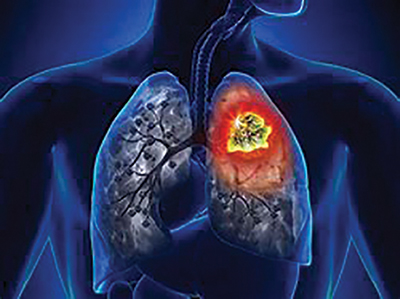—
By Marsha Mullings, MPH
What is Lung Cancer?
Cancer is a term that describes a collection of related diseases. Cancer occurs when some of the body’s cells divide continuously and invade surrounding cells. Cancerous cells can start anywhere in the body and spread to localized regions (around the point of origin) and then to distant parts of the body, away from the site of origin.
When cancer begins in the lungs, it is called lung cancer. Lung cancer may spread to lymph nodes or other organs in the body, such as the brain. Cancer from other organs also may spread to the lungs.
-Lung cancer is the second most diagnosed cancer in both men and women in the US.
It is the leading cause of cancer death among both men and women.
-The median age at diagnosis is 71.
-The median age at death is 72.
-Non-small cell lung cancer – cancer that originates in the large cells around the lung – accounts for about 85% of lung cancer in the US.
-The prognosis for lung cancer is poor; five-year relative survival rate is 22%.
Symptoms of Lung Cancer
The symptoms of lung cancer are different for different individuals, depending on the stage of the cancer. Symptoms may include:
* A persistent cough that worsens over time.
*(Chest pain.
*Shortness of breath.
*Wheezing.
*Coughing up blood.
*Feeling very tired all the time.
*Weight loss with no known cause.
Risk Factors
Several risk factors may increase a person’s chance of developing lung cancer:
-Smoking – smoking is the number one risk factor for lung cancer. Cigarette smoking is linked to 80%-90% of all lung cancer deaths in the United States. The smoke from tobacco contains more than 7,000 chemicals, many of which are carcinogenic (cancer-causing).
-Lung cancer risk increases with the number of cigarettes smoked and the years for which a person has been a smoker.
-Second-hand smoke from other people’s cigarettes, cigars, or pipes can cause lung cancer.
-Radon – Radon is a naturally occurring gas that emanates from rocks and the soil. It can sometimes seep into homes and become trapped there. It is the second leading cause of lung cancer.
-Other substances such as asbestos, arsenic, diesel exhaust and some forms of silica are risk factors for developing lung cancer. The risk from these exposures increases if the person exposed is also a smoker.
-Family history of lung cancer –lung cancer risk increases if a family member had smoked or had been exposed to radon.
Disparities
Compared with other groups, African Americans are disproportionally affected by lung cancer – having the highest mortality rates and the worst survival statistics of all population groups.
-African Americans are lighter smokers and initiate smoking later in life but are more likely than other groups to suffer a higher disease burden from lung cancer. This is particularly true for African American males.
-African Americans are less likely than whites to successfully quit smoking, therefore increasing the likelihood of developing lung cancer later in life.
-African Americans have the lowest 5-year survival for early-stage non-small cell lung cancer.
-Studies find that Black patients were 66% less likely to receive timely and appropriate treatment for lung cancer, compared with whites.
-Black patients are 34% less likely to receive timely surgery, chemotherapy, or radiation for stage III disease.
-Black patients are 51% less likely to receive timely chemotherapy for stage IV disease.
-Black men were less likely to receive surgical resection as a treatment option for their disease.
Outlook
According to the Centers for Disease Control and Prevention (CDC), states and local communities can play a key role in helping people lower their lung cancer risk by using tried and tested approaches to reducing the incidence of lung cancer in all communities. Some of these include efforts to —
-Reduce minors’ access to tobacco products and e-cigarettes.
-Help people quit using tobacco products.
-Help people avoid secondhand smoke.
-Reduce people’s exposure to radon.
-Encourage people to be screened for lung cancer as recommended.
Beyond these general approaches, efforts to increase health literacy regarding smoking and lung cancer, improving patient care advocacy for newly diagnosed patients, and engaging culturally competent health care providers for African Americans, must be incorporated into programs to reduce the scourge of lung cancer among African Americans.
For more information on lung cancer, visit www.cancer.org, www.cancer.gov, www.cdc.gov/cancer/lung
For help quitting smoking, please visit www.tobaccofreeflorida.com, www.cdc.gov/quit

